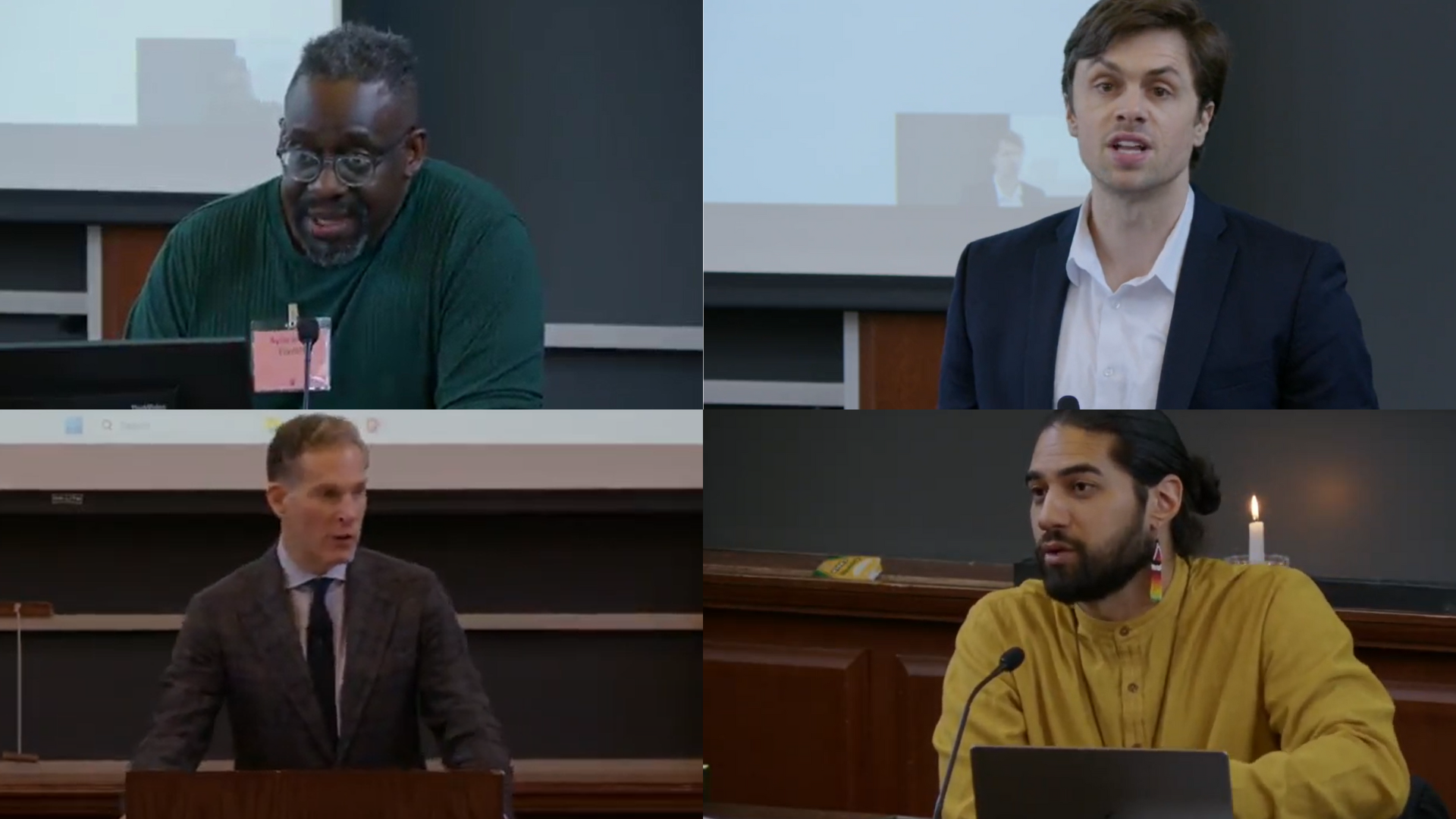What a Psychedelic Church Reveals about Religion and the Law
On Nov. 11, 2024, Bridger Lee Jensen stepped out of his church, Singularism, and was surrounded by police. They detained him, searched the church, and seized an alleged 450 grams of dried psilocybin mushroom.

Published
Author
Share
On Nov. 11, 2024, Bridger Lee Jensen stepped out of his church, Singularism, and was surrounded by police. They detained him, searched the church, and seized an alleged 450 grams of dried psilocybin mushroom.
Singularism is contesting the seizure on the grounds that psilocybin is the church’s “sacrament” and alleging violation of the group’s religious rights under the First Amendment and Utah’s version of the federal Religious Freedom Restoration Act (RFRA). Churches can invoke the federal Religious Freedom Restoration Act to protect their religious practices. However, the federal law does not apply to state governments. Many states, including Utah, have their own versions of the federal law called mini-RFRAs. Singularism’s case is being heardin Utah’s Federal District Court.
The court is being asked to assess the validity of the Singularism religion to determine if their psilocybin use is protected by Utah’s mini-RFRA. The case offers a window into the judicial criteria to evaluate religions and raises critical questions about the ethical implications of such assessments.
“Bona Fide” Religion
The Federal District Court is assessing Singularism’s religious “sincerity” using a five-factor test from a 1996 case in the 10th Circuit, United States v. Meyers. In the case, David Meyers argued that as the Reverend of the Church of Marijuana his religious beliefs motivated him to use, possess, and distribute marijuana. He argued that laws prohibiting this religiously motivated conduct unduly burden his constitutional right to free exercise of religion and thus his actions should be permitted under RFRA. In its decision, the court articulated five qualities of “sincere” or “bona fide” religions: addressing ultimate ideas, such as questions about “life, purpose, and death”; holding metaphysical beliefs; articulating a moral or ethical system; having beliefs that are comprehensive; and demonstrating accoutrements of religion. However, the 10th Circuit ultimately ruled against Meyers.
In the ongoing Singularism case, the Provo City and Utah County governments, as the Defendants, claimed that Singularism does not meet the criteria set forth in Meyers and “cannot establish that their psilocybin use is ‘substantially motivated by a sincerely held religious belief.’” I focus here on how the court, using Meyers, interpreted Singularism’s religious beliefs.
Beliefs and Answers
The Defendants (hereafter, the government) argues that Singularism fails to provide its members with concrete beliefs concerning the nature of reality and life’s biggest questions. Much of the government’s analysis focuses on how Singularism imparts its beliefs, rather than the beliefs themselves. They quote Jensen’s testimony stating that Singularism “does not claim special access to divine truths or elevate itself above others” and argue this approach represents “personal opinions, not ‘a deeply held religious conviction.’” They write that Singularism’s “members are free to believe in any comprehensive belief from any religion” (emphasis original), which is presented as evidence that their beliefs lack comprehensiveness.
This reveals a fundamental disagreement between the government and Singularism on the nature of religion and religious community. For the church and for Jensen, a religion need not offer its members exclusive answers to all ultimate questions nor expect its adherents to share all the same beliefs. In fact, Jensen views such approaches with skepticism. In his testimony, he explains that “rigid dogma closes people off from spirituality and spiritual connection.”
Instead, Singularism’s religion privileges self-discovery and encourages members to cultivate their own, authentic relationships with the divine. Providing prescriptive or directive theological instruction undermines these goals. Jensen told me he is careful not to “stunt [members] from having their own [insights],” which he believes can occur if Singularism’s doctrines or his own personal experiences are communicated too forcefully.
Singularism describes itself as a non-exclusive, “multiversal, faith-affirming religion,” meaning that members may belong to other religious communities and hold beliefs that differ from Jensen or Singularism. They embrace multiple religious belonging—having membership in multiple religious traditions simultaneously—which is common around the world and in the United States. However, the government took this as evidence that Singularism lacked religious sincerity.
Disagreements about the importance of religious authority and exclusivity appeared most starkly when Jensen was asked by the government if he considered himself to be a prophet. One of the “accouterments of religion” in Meyers is having a “founder, prophet, or teacher… who is considered to be divine, enlightened, gifted, or blessed.” And Jensen felt like the government was challenging him to be a “prophet alone,” with sole access to divine insight. This is antithetical to Jensen’s understanding of religion. He believes that all-knowing leaders prevent members from obtaining their own religious insights and can lead to harm. Recounting his testimony in an interview, he told me “they [the government] asked me, ‘Do you have answers to life’s biggest questions?’ I was like, ‘no!’ And anybody who says they do, that’s the scam artist you’re looking for.”
What are the risks?
The impact of the Meyers test is broader than the precedent it set in the 10th Circuit. In addition to guiding courts’ assessment of churches like Singularism, Meyers is shaping the formation of psychedelic churches across the country. In my own ethnographic research with novel psychedelic churches, Meyers is used as a clear and practicable framework for determining the criteria a church must meet to be considered sincere by the courts. Similarly, the Guide to RFRA and Best Practices for Psychedelic Plant Medicine Churches, assembled by the psychedelic nonprofit Chacruna, cites Meyers extensively when presenting what constitutes protected “religious exercise.” The criteria Meyers put forth may not have helped Reverend Meyers but are shaping the present and future of American psychedelic religions. Singularism’s case suggests this may have unintended consequences, as there are potential social and moral benefits to the religious structures the government claims are evidence of insincerity.
In a preliminary injunction in February, the judge presiding over the case wrote that Singularism’s approach to belief was not evidence of religious insincerity but rather reflected their commitment to “existential humility,” or the “holding [of] cherished beliefs regarding the meaning of life and death loosely enough to revise in light of evidence.” She continued that it would be “inappropriate to hold Singularism’s existential humility against it,” especially since “existential humility is important for enabling and supporting the smooth functioning of a pluralistic society like ours.”
Beyond promoting tolerance and openness, avoiding rigid doctrines and messianic leadership may be particularly important for psychedelic-using religions. Psychedelics are thought to increase suggestibility and can contribute to grandiosity. The misapplication of these substances has contributed to significant religiousharm. Singularism consciously tries to avoid these risks; their statement of belief, in fact, includes a section about avoiding “cultish behavior.” It is ironic that the approaches they took to avoid cult-like behavior were used as evidence that they lack religious sincerity. If courts were to broadly embrace the government’s reading of Meyers in this case, it would incentivize emergent psychedelic religions to adopt prophetic leadership, narrow orthodoxy, and exclusive communities. Without a nuanced application of Meyers, attuned to the particularities of psychedelic sacraments, the courts may find that they have promoted sincerity at the cost of safety.


